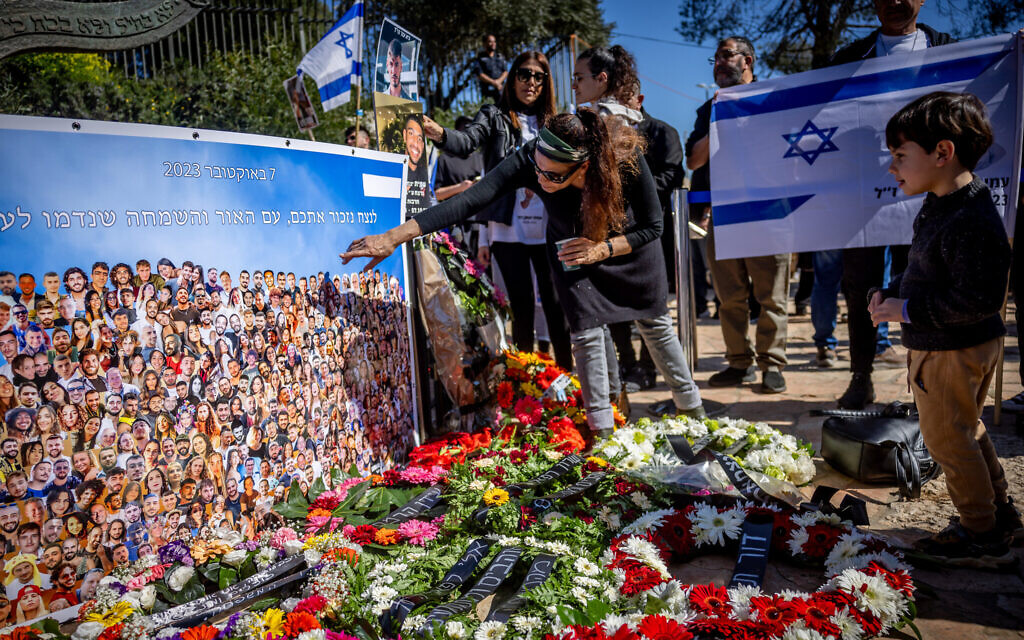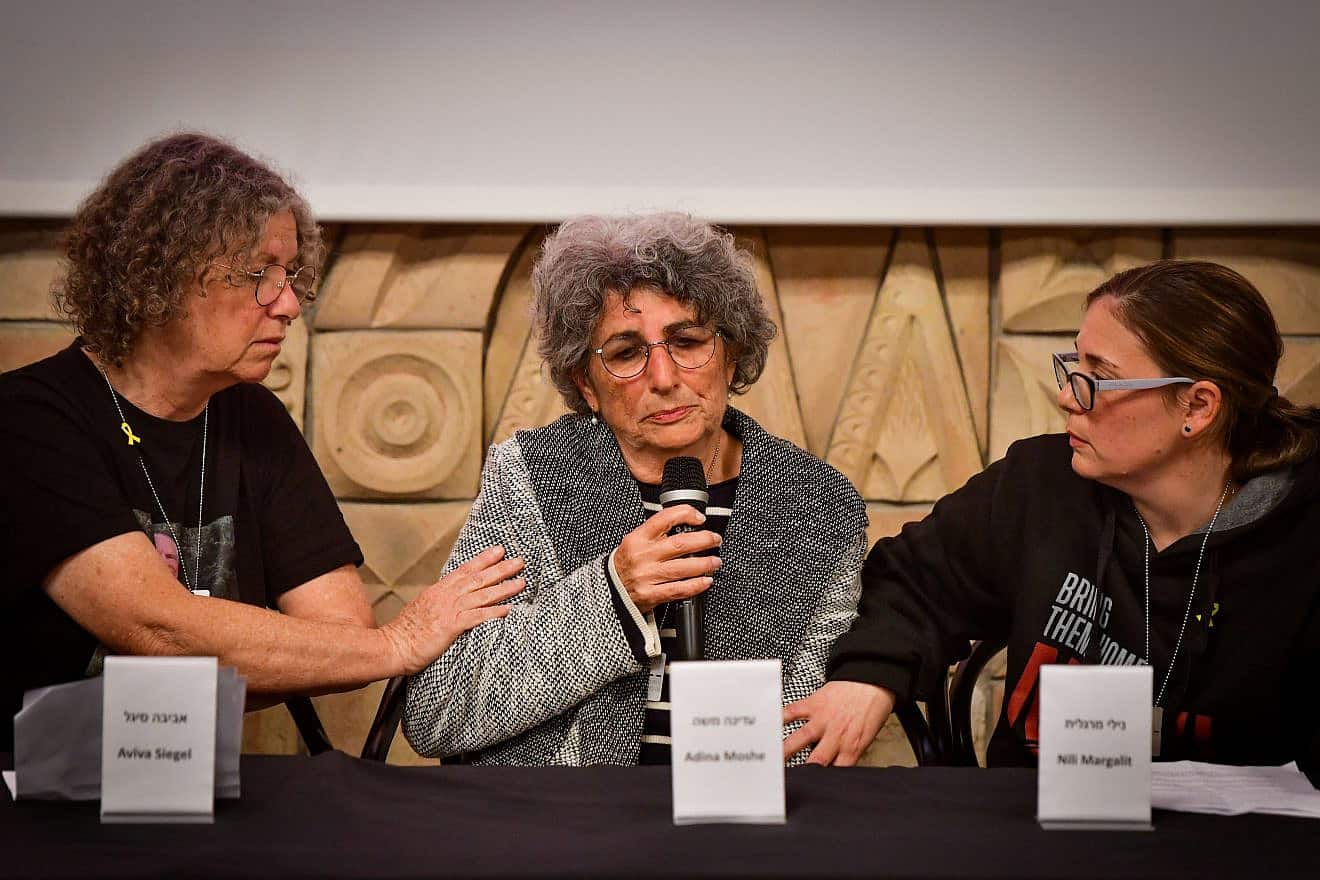 Rodziny Izraelczyków zamordowanych przez terrorystów Hamasu na festiwalu Nova umieszczają zdjęcia swoich bliskich przed Knesetem w Jerozolimie, 7 lutego 2024 r. (Yonatan Sindel/Flash90)
Rodziny Izraelczyków zamordowanych przez terrorystów Hamasu na festiwalu Nova umieszczają zdjęcia swoich bliskich przed Knesetem w Jerozolimie, 7 lutego 2024 r. (Yonatan Sindel/Flash90)
 ONZ: Terroryści z Hamasu gwałcili i torturowali Izraelki, w tym zakładniczki
ONZ: Terroryści z Hamasu gwałcili i torturowali Izraelki, w tym zakładniczki
Marta Urzędowska
Specjalny zespół ONZ potwierdza, że zebrał “wyraźne i przekonujące informacje”, iż palestyńscy terroryści gwałcili Izraelki i poddawali je innym formom przemocy seksualnej zarówno podczas październikowego ataku na Izrael, jak i później, przetrzymując je w niewoli w Strefie Gazy
Wyniki śledztwa przedstawiono w poniedziałek. Pramila Patten, specjalna wysłanniczka ONZ ds. przemocy seksualnej w strefach konfliktu, wraz z dziewięcioosobowym zespołem w pierwszej połowie lutego pojechała do Izraela, by ustalić, czy terroryści z Hamasu dopuszczali się przemocy seksualnej na izraelskich kobietach i dzieciach. Chodziło zarówno o przemoc podczas ataku Hamasu na Izrael z 7 października, kiedy terroryści zamordowali 1,2 tys. osób, a 250 porwali do Gazy, jak i o los uprowadzonych przez nich zakładniczek.
Doniesienia o najbardziej bestialskich formach przemocy seksualnej, jakich dopuszczali się terroryści na Izraelkach, pojawiły się tuż po atakach. Do mediów trafiły przerażające opowieści o kobietach wielokrotnie gwałconych, okaleczanych, torturowanych, często na oczach bliskich. Zespół Pattel pojechał na miejsce, by poszukać potwierdzenia tych informacji.
Ofiary odmówiły rozmów
W skład zespołu wchodziło dziewięciu ekspertów związanych z ONZ, wśród nich specjaliści od rozmów z ofiarami i świadkami przemocy, eksperci ds. kryminalistyki i analitycy danych. Przeprowadzili kilkadziesiąt spotkań, m.in. z przedstawicielami izraelskich ministerstw i służb bezpieczeństwa. Odwiedzili narodowe centrum medycyny sądowej, kostnicę, do której przewożono ciała ofiar, a także miejsca ataków Hamasu z 7 października, gdzie – według wcześniejszych doniesień – dochodziło do aktów przemocy seksualnej. Przeanalizowali 5 tys. zdjęć i 50 godzin nagrań z ataków, rozmawiali z 34 osobami – ratownikami, lekarzami, ofiarami i świadkami, a także uwolnionymi zakładnikami przetrzymywanymi wcześniej w Gazie.
Eksperci przyznają, że ich zadanie było trudne. Opisują, że izraelskie władze i służby z powodu rozmiarów ataku, ogromnej liczby ofiar i wielu oddalonych od siebie miejsc zbrodni nie były w stanie skutecznie zebrać dowodów, szczególnie że priorytetem było zadbanie o bezpieczeństwo na zaatakowanych terenach, ratowanie ofiar, czy organizowanie pochówku zamordowanych zgodnie z zasadami religii.
Członkowie zespołu ONZ podkreślają, że wiele dowodów przepadło, bo na miejscu pomagali niewykwalifikowani ochotnicy. Inne zostały zniszczone, bo terroryści spalali ciała ofiar. Zaznaczają, że niewielka liczba ofiar i świadków przemocy seksualnej przeżyła ataki.
Zespołowi Pattel nie udało się porozmawiać bezpośrednio z osobami, które doświadczyły przemocy seksualnej. Niektóre nadal są leczone z powodu przeżytego koszmaru, inne wyjechały z kraju, jeszcze inne nie chcą rozmawiać, bojąc się stygmatyzacji.
„Brak zaufania ze strony ofiar ataków i rodzin zakładników do instytucji narodowych i organizacji międzynarodowych, jak ONZ, w połączeniu z ogromną uwagą mediów krajowych i międzynarodowych w przypadku osób, które upubliczniły swoje historie, utrudniają dostęp do ofiar ataków, w tym przemocy seksualnej” – tłumaczy Patten.
Jasne dowody na przemoc seksualną
Mimo napotkanych w toku postępowania trudności, ustalenia wysłanniczki i jej zespołu nie pozostawiają wątpliwości. „ W oparciu o zebrane informacje znaleziono jasne i przekonujące informacje potwierdzające, że na zakładnikach dopuszczano się przemocy seksualnej, w tym gwałtów, seksualnych tortur, okrutnego, nieludzkiego i poniżającego traktowania. Uważamy też, że w przypadku zakładników nadal pozostających w niewoli takie formy przemocy mogą trwać do dziś” – czytamy w podsumowaniu ze śledztwa zamieszczonym na oficjalnych stronach ONZ.
Autorzy dodają, że „istnieją wiarygodne powody, by wierzyć, że przemoc seksualna związana z konfliktem miała miejsce w wielu lokalizacjach podczas ataku z 7 października”. „Gwałty, w tym zbiorowe, odbywały się w co najmniej w trzech miejscach: na festiwalu muzycznym Nova, na drodze 232 i w kibucu Reim. W większości przypadków zgwałcone ofiary były potem zabijane, a co najmniej dwa zbadane incydenty potwierdzają gwałty na ciałach nieżyjących kobiet”- relacjonują.
Choć autorzy podkreślają, że z szacunku dla ofiar i dla dobra osób, które przeżyły, nie opisują szczegółów, a swoje odkrycia relacjonują jedynie w sposób „ogólny”, przytaczane przez nich fakty są drastyczne. „W wielu lokalizacjach znaleziono ofiary, gównie kobiety, całkowicie albo częściowo nagie, związane i postrzelone” – opisują.
Nie wszystkie zbrodnie udało się potwierdzić
Choć zespół Patten zdecydowanie potwierdza, że 7 października terroryści z Hamasu dopuszczali się wyjątkowo bestialskich aktów przemocy seksualnej, jednocześnie podkreśla, że nie udało się potwierdzić niektórych drastycznych incydentów opisywanych szeroko w mediach tuż po ataku.
„W niektórych lokalizacjach, jak w kibucu Kfar Azza, poszlaki wskazują na pewne formy przemocy seksualnej, ale nasz zespół nie był w stanie potwierdzić, że doszło do gwałtów. Z kolei w kibucu Beeri ustaliliśmy, że w co najmniej dwóch przypadkach doniesienia o przemocy seksualnej szeroko opisywanej w mediach są nieuzasadnione. Wśród nich drastyczny przypadek ciężarnej kobiety, której brzuch rzekomo został rozcięty, zanim została zabita, a płód miał być dźgany nożem. Także w bazie wojskowej Nahal Oz, nie byliśmy w stanie potwierdzić opisywanego przypadku gwałtu, ani znaleźć dowodów na celowe okaleczanie narządów płciowych żołnierek i żołnierzy, choć analiza kryminalistyczna wskazywała na obrażenia różnych części ciała, także genitaliów. Ogólnie jednak, jeśli chodzi o okaleczanie narządów płciowych, zespół nie był w stanie potwierdzić, że istniał stały wzorzec postępowania”.
Jednocześnie zespół przyznaje, że „prawdziwy zakres przemocy seksualnej dokonywanej zarówno podczas ataków z 7 października, jak i po nich, może być ustalany latami, a być może – nigdy nie zostanie w pełni poznany”.
ONZ: Przemoc seksualna również na Palestynkach
Rozmowy ze zwolnionymi przez Hamas zakładnikami potwierdzają, że w Strefie Gazy terroryści dopuszczają się przemocy seksualnej na porwanych kobietach i dzieciach. Choć większość kobiet i dzieci zwolniono w ramach rozejmu w listopadzie ubiegłego roku, kilkadziesiąt nadal pozostaje w rękach Hamasu.
W przypadku zakładniczek nie ma dowodów, że były gwałcone, ale pojawiają się oskarżenia o inne formy przemocy seksualnej, w tym – „inwazyjne przeszukiwanie, dotykanie miejsc intymnych, zmuszanie do zdejmowania hidżabu, a w przypadku mężczyzn – grożenie zgwałceniem żon, sióstr, czy córek” – opisuje zespół Pattel.
Zespół ONZ odwiedził też Zachodni Brzeg Jordanu i przytacza doniesienia palestyńskich władz i organizacji społeczeństwa obywatelskiego, według których po atakach z 7 października także izraelscy żołnierze i osadnicy dopuszczali się aktów przemocy seksualnej na Palestynkach, podczas nalotów na domy, na posterunkach i w aresztach.
Izraelskie władze chwalą doniesienia Pattel na temat przemocy ze strony Hamasu, ale ostro krytykują oskarżenia pod adresem Izraelczyków. – To drwina i celowe działanie Palestyńczyków – zestawiać koszmarne zbrodnie popełniane przez Hamas z bezpodstawnymi oskarżeniami wymierzonymi w Izrael i Izraelczyków – przekonuje w oświadczeniu Lior Haiat, rzecznik izraelskiego MSZ. Z kolei minister spraw zagranicznych Israel Katz w poniedziałek odwołał ambasadora Izraela przy ONZ na „konsultacje” i oskarżył organizację o „próbę uciszenia doniesień o masowych gwałtach”.
Zawartość publikowanych artykułów i materiałów nie reprezentuje poglądów ani opinii Reunion’68,
ani też webmastera Blogu Reunion’68, chyba ze jest to wyraźnie zaznaczone.
Twoje uwagi, linki, własne artykuły lub wiadomości prześlij na adres:
webmaster@reunion68.com



